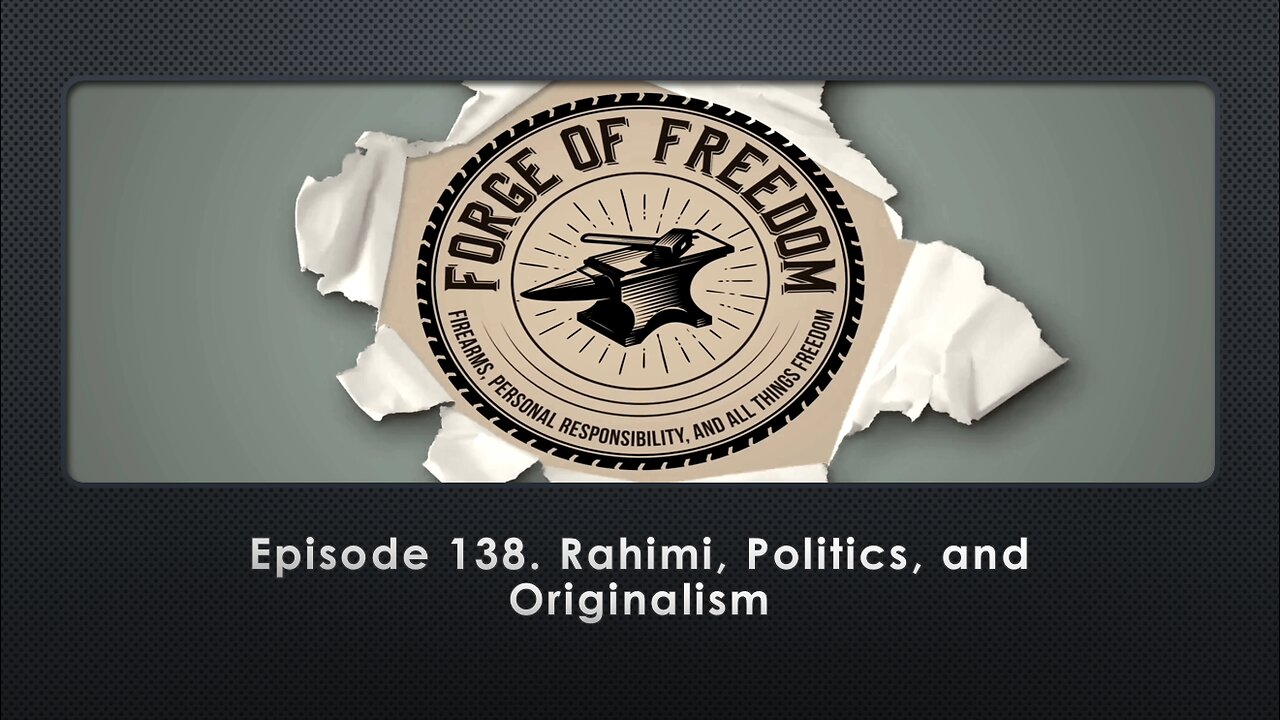Premium Only Content

Episode 138. Rahimi, Politics, and Originalism
Show Notes
Episode 138. Rahimi, Politics, and Originalism
In this episode of the Forge of Freedom podcast, host Alex Ooley discusses the recent Supreme Court decision in the Rahimi case, which challenged the constitutionality of a federal statute prohibiting the possession of firearms and ammunition by someone subject to a domestic violence restraining order. Ooley argues that while some commentators view the decision as a victory for the Second Amendment, it is actually a loss, albeit not as bad as it could have been. He provides background on Second Amendment litigation and the Supreme Court's previous decisions in the Heller and McDonald cases. Ooley analyzes the court's opinion in Rahimi, highlighting the use of historical analogs and the potential implications for future gun control regulations. The main theme is the interpretation of the Second Amendment and the application of the text, history, and tradition analysis. The conversation highlights the disagreement among the justices regarding the proper methodology for evaluating gun control laws. The dissenting opinion by Justice Thomas is praised for its adherence to originalism and the recognition of the Second Amendment as a barrier to government infringement. The conversation also touches on the potential implications of the decision for future gun control laws.
Chapters
00:00 The Rahimi Decision: A Loss for the Second Amendment
02:14 Background on Second Amendment Litigation
05:03 The Supreme Court's Opinion in Bruin
07:00 Interpreting the Constitution and the Bill of Rights
14:48 Analyzing the Supreme Court's Opinion in Rahimi
33:30 Concurring and Dissenting Opinions
34:46 Interpreting the Second Amendment
36:14 The Law Trapped in Amber
39:08 The Methodology Debate
50:25 The Presumption Against Restrictions
56:29 Justice Thomas's Dissenting Opinion
01:00:04 Implications for Future Gun Control Laws
Resources
Rahimi
https://www.supremecourt.gov/opinions/23pdf/22-915_8o6b.pdf
https://www.scotusblog.com/case-files/cases/united-states-v-rahimi/
Kostas Moros on X (@MorosKostas)
https://x.com/moroskostas/status/1804253379528659042?s=43
2A
History on X (@2AHistory)
https://x.com/2aHistory/status/1804765586875945307
https://twitter.com/GunFoundation/status/1804162255795167356/photo/1
FPC (@gunpolicy)
https://www.firearmspolicy.org/fpc-statement-on-rahimi-decision-by-us-supreme-court
GOA
(@GunOwners)
https://www.gunowners.org/goa-reaction-scotus-rules-against-second-amendment-in-u-s-v-rahimi/
SAF
(@2AFDN)
https://saf.org/saf-statement-on-supreme-courts-rahimi-decision/
Trapped
in Amber
https://image4.slideserve.com/9136446/amber-l.jpg
SCOTUSblog
re Rahimi
https://www.scotusblog.com/2024/06/supreme-court-upholds-bar-on-guns-with-domestic-violence-restraining-orders/
TenthAmendmentCenter (@TenthAmendment) / X
https://x.com/TenthAmendment
Takeaways
The Supreme Court's decision in the Rahimi case is viewed by some as a victory for the Second Amendment, but it is actually a loss, although not as bad as it could have been.
The court's opinion in Rahimi relies on historical analogs, such as surety laws and going armed laws, to justify the constitutionality of the federal statute prohibiting the possession of firearms by individuals subject to domestic violence restraining orders.
The use of historical analogs in the court's opinion sets a precedent for upholding gun control regulations that may be considered unconstitutional by some.
The decision in Rahimi highlights the ongoing debate over the interpretation of the Second Amendment and the balance between individual rights and public safety.
The composition of the Supreme Court and future appointments will likely have a significant impact on Second Amendment litigation and the interpretation of gun control laws. The Supreme Court case United States v. Rahimi involves the interpretation of the Second Amendment and the application of the text, history, and tradition analysis.
The justices disagree on the proper methodology for evaluating gun control laws, with some favoring a broad reading of the Second Amendment and others emphasizing the prevention of physical threats of violence.
Justice Thomas's dissenting opinion is praised for its adherence to originalism and the recognition of the Second Amendment as a barrier to government infringement.
The decision in United States v. Rahimi may have implications for future gun control laws and the balance between individual rights and public safety.
Sound Bites
"The Supreme Court handed down their opinion in an 8 to 1 decision."
"This is not a victory at all. It's just not as bad of a loss as it could have been."
"In 2008, the United States Supreme Court decided the Heller case, which was the first case decided by the Supreme Court that interpreted the Second Amendment to protect an individual right."
"That shared principle is sufficient."
"The law trapped in amber."
"A broad reading of the text, history, and tradition."
Keywords
Supreme Court, Rahimi case, Second Amendment, domestic violence restraining order, federal statute, Heller case, McDonald case, Bruen case, gun control regulations, Supreme Court, Second Amendment, gun control laws, text history and tradition analysis, originalism, dissenting opinion, Justice Thomas
#freedom
#Rahimi
#SCOTUS
#2A
#firearms
#JamesMadison
#Federalist
#AntiFederalist
#selfdefense
#naturalrights
#liberty
#propertyrights
#TenthAmendmentCenter
#TAC
#ForgeofFreedom
DISCLAIMER: This podcast is for informational purposes only and should not be considered legal, medical, or financial advice. The views expressed in this podcast are those of the hosts and guests and do not necessarily reflect the views of any organizations or individuals they may mention. The hosts and guests are not liable for any damages that may result from someone listening to this podcast.
-
 45:16
45:16
The Forge of Freedom
3 months agoEpisode 183. Liberty and Learning with the Tuttle Twins
951 -
 LIVE
LIVE
Spartan
4 hours agoRanked and Expedition 33 (NG+4 and all enemies Set to 10x health)
88 watching -
 LIVE
LIVE
Jokeuhl Gaming and Chat
7 hours agoDARKTIDE - Warhammer 40k w/ Nubes and AoA
98 watching -
 2:19:56
2:19:56
Nerdrotic
14 hours ago $2.68 earnedNerdrotic Nooner 513
28.4K2 -

BigTallRedneck
3 hours agoRANKED FINALS W OMEGA
3.71K -
 LIVE
LIVE
Eternal_Spartan
11 hours ago🟢 Eternal Spartan Plays Final Fantasy 7 Rebirth Ep. 3 | USMC Vet | Join the Best Chat on Rumble
77 watching -

megimu32
2 hours agoOTS: Ace Ventura & The Death of 90s Comedy
7.32K8 -
 1:14:30
1:14:30
We Like Shooting
15 hours ago $0.74 earnedDouble Tap 426 (Gun Podcast)
6.02K1 -
 4:32:32
4:32:32
Meisters of Madness
5 hours agoWuchang Returns with Madness & Ranked Finals
5.68K -
 2:27:03
2:27:03
Illyes Jr Gaming
3 hours agoBlack Ops 6 Action Reppin @Mystivis
1.36K